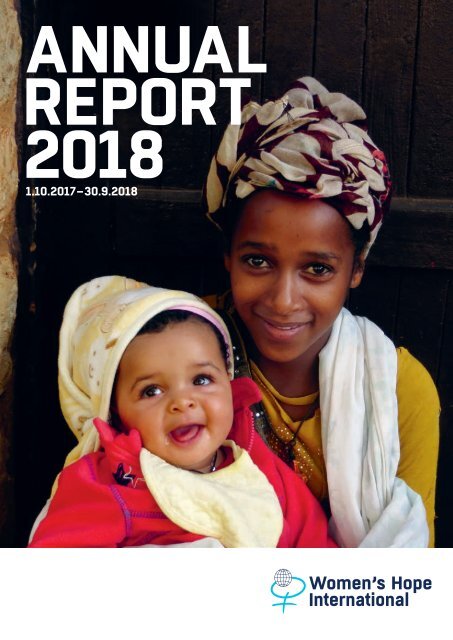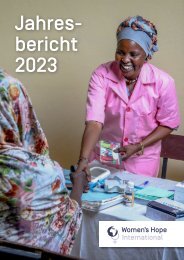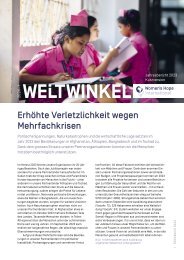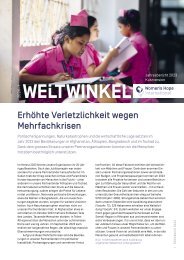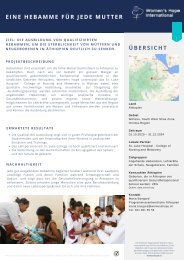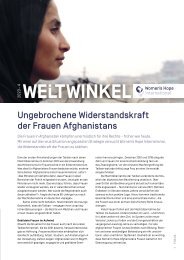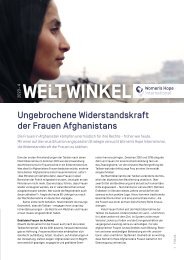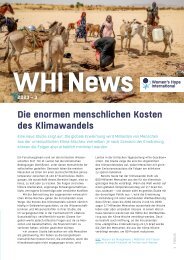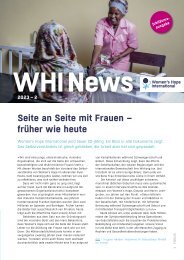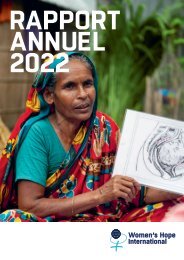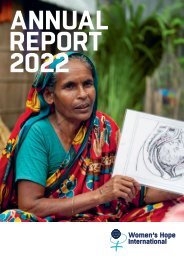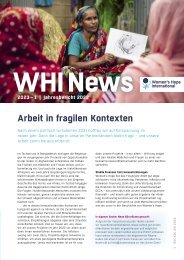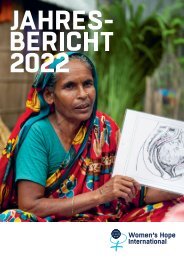WHI_Annual Report 2018
Create successful ePaper yourself
Turn your PDF publications into a flip-book with our unique Google optimized e-Paper software.
ANNUAL<br />
REPORT<br />
<strong>2018</strong><br />
1.10.2017 – 30.9.<strong>2018</strong>
Editorial................................................... 1<br />
Who We Are.......................................... 2<br />
How We Work....................................... 3<br />
Where We Work................................... 4<br />
Key Data.................................................. 5<br />
Ethiopia................................................... 6<br />
Chad......................................................... 14<br />
Afghanistan............................................ 16<br />
Bangladesh............................................ 18<br />
Raising Awareness.............................. 22<br />
Financial <strong>Report</strong>.................................... 24<br />
Performance <strong>Report</strong>............................ 30<br />
2
Earth provides enough to<br />
satisfy every man’s need but<br />
not every man’s greed.<br />
Mahatma Gandhi<br />
We’re sitting round an open log fire in a two-century-old cabin in the remote Grison Alps, far<br />
from civilisation. Outside the weather is bleak. But we enjoy the simplicity, the crackling fire,<br />
the warmth amid light snowfall, a glass of wine. There is no need to go outside: our cabin has<br />
running water, a toilet, firewood and enough food for a fine meal. We are warm and dry. This<br />
apparent simplicity is thus a luxury we afford ourselves during the festive break.<br />
We’re sitting on a tarpaulin mat in a mud hut, rain beating down on the tin roof and drowning<br />
out our conversation as insects buzz intrusively. Everything is clammy. A small fire smoulders<br />
in the adjoining hut; smoke fills the room and drifts over to us. Zenaba is cooking millet. Having<br />
gathered firewood for a full day, she sends her young daughter Habiba to fetch water from the<br />
village well. The family shares a walled but roofless pit toilet with their neighbours. Everyone in<br />
the village hopes for a good rainy season, essential for an adequate harvest. In Chad, simplicity<br />
is no luxury, but a harsh, everyday reality.<br />
How much do I really need to be happy? More and more people are asking themselves this very<br />
question and discovering minimalism as a countermovement to consumerism – a growing trend<br />
in Western society. It is a conscious decision to go without to make room for that which is essential.<br />
However, in the countries where we run our projects, essential living means nothing more than<br />
simple survival: sufficient food, access to drinking water, good medical care, protection from<br />
violence and despotism, guaranteed human rights.<br />
For 15 years, Women’s Hope International (<strong>WHI</strong>) has been supporting people who are in no position<br />
to reject wealth or abundance. The women we work with make do with the little they have –<br />
and often despite obstetric injuries caused by complicated births.<br />
Together with our partners on the ground, we’ve been lending our support to individuals and communities<br />
in Afghanistan, Bangladesh, Ethiopia and Chad. The <strong>Annual</strong> <strong>Report</strong> you are currently<br />
reading will tell you more about our work.<br />
The success of our work is down to the efforts of our many friends and members of <strong>WHI</strong>; charities,<br />
corporations and public donations help us realise our projects. A big thank you to everyone<br />
who supports <strong>WHI</strong> and feels connected to our work and our vision.<br />
Dr. med. Martin Leimgruber<br />
President<br />
1
Who We Are<br />
Women’s Hope International (<strong>WHI</strong>) is a Swiss non-profit organisation involved in<br />
improving living standards for women and girls in Ethiopia, Afghanistan, Bangladesh<br />
and Chad. <strong>WHI</strong> forms long-term partnerships with local actors aimed at<br />
strengthening self-sufficiency, responsibility and competence. Wherever possible,<br />
the projects are coordinated with the governmental healthcare system. <strong>WHI</strong> has<br />
been certified by the Zewo Foundation, Switzerland.<br />
Our Vision<br />
Women and girls are fully respected and valued in all spheres of life. Sexual and<br />
reproductive health is guaranteed through bodily autonomy as well as through<br />
safe and competent care throughout pregnancy, during childbirth and beyond. The<br />
global maternal mortality rate is as low as in industrialised nations. Obstetric<br />
trauma injuries have been eliminated.<br />
Our Values<br />
• Our support for people is independent of their age, origin,<br />
language, religion, culture, social status and political<br />
beliefs.<br />
• Our actions are motivated by our respect for life and our<br />
commitment to the socially disadvantaged. We stand for<br />
equal rights for women and men.<br />
• Our engagement is founded on fundamental and human<br />
rights and follows Christian ethics.<br />
Our Mission<br />
Strong Women<br />
Empowerment of women<br />
We advocate and reinforce the standing of women and<br />
girls in society and fight for their right to self-determination<br />
and full participation. We significantly contribute to the<br />
elimination of child marriage and forced marriage. We campaign<br />
for female access to consultation regarding sexual<br />
and reproductive health.<br />
Safe Childbirths<br />
Competent care during pregnancy, childbirth and<br />
the puerperium<br />
We advocate professional assistance during pregnancy,<br />
childbirth and the puerperium or postnatal period. To<br />
achieve this, we support the training and further education<br />
of midwives, we help strengthen sexual and reproductive<br />
healthcare within established healthcare systems and we<br />
assist in setting up vital new structures.<br />
Healing Obstetric Fistula<br />
Healing obstetric injuries<br />
Our focus is the identification, treatment, rehabilitation and<br />
reintegration of women and girls suffering from obstetric<br />
fistula. Obstetric fistulas are severe internal injuries that<br />
are sustained from prolonged labour and professionally<br />
unsupervised childbirth and lead to incontinence.<br />
2
How We Work<br />
In implementing our projects and programmes we adhere<br />
to the following principles:<br />
• We fulfil each mission competently, effectively and effi -<br />
ciently. Our work is participatory and has a human<br />
rights-based approach.<br />
• We concentrate on select countries in Africa and Asia<br />
with high maternal mortality rates.<br />
• We implement projects and programmes independently<br />
as well as in collaboration with local partners.<br />
• It is important to us to strengthen our partners’ autonomy<br />
and responsibility and to promote mutual learning.<br />
• Our projects and programmes are innovative and sustainable.<br />
Wherever possible, they are coordinated with<br />
the governmental healthcare system.<br />
• Our interventions strengthen the connection between<br />
local communities and public health services.<br />
• We regularly assess the relevance, efficiency, effect and<br />
sustainability of our projects and programmes.<br />
• We are part of a national and international network<br />
committed to the same goals and are in frequent communication<br />
with other organisations.<br />
Planning and Developing New<br />
Projects<br />
Programme Review Committee<br />
New projects and programmes are first assessed by external<br />
experts and then presented to the Board of Directors<br />
with a recommendation or rejection.<br />
Committee members in the last financial year were:<br />
• Dr. Alexander Bischoff, Institute for Nursing Science<br />
(INS), University of Basel<br />
• Dr. Susanna Hausmann-Muela, Partners for Applied<br />
Social Sciences (PASS)<br />
• Dr. Kate Molesworth, Swiss Tropical and Public Health<br />
Institute<br />
• Helena Zweifel, former chief executive, Medicus Mundi<br />
Switzerland<br />
• We strive for good communication within and without.<br />
• We use natural resources responsibly.<br />
Project staff in Bangladesh participating in a workshop<br />
3
Where We Work<br />
Bangladesh<br />
Chad<br />
Afghanistan<br />
Ethiopia<br />
Our Partners<br />
Country Partner Organisation Projects Focus *<br />
Ethiopia Hamlin Fistula Ethiopia Midwifery training B<br />
Expand maternal healthcare services B<br />
St. Luke Catholic Hospital Midwifery training B<br />
Maternity waiting home for women with high-risk pregnancies B<br />
Attat Catholic Hospital Maternity waiting home for women with high-risk pregnancies B<br />
WAHA (Women and<br />
Health Alliance)<br />
Support treating obstetric fistula F<br />
CUAMM Well-being of mother and child (project completed) B<br />
Organization for Welfare and<br />
Development in Action (OWDA)<br />
Well-being of mother and child based on strengthening local<br />
initiatives (new project)<br />
B<br />
Chad<br />
BASE (Bureau d’Appui Santé<br />
et Environnement)<br />
Basic health for mother and child (new project) B<br />
Afghanistan CURE International Hospital Prevention and treatment of obstetric injuries B F<br />
PUI (Première Urgence<br />
Internationale)<br />
Safe childbirth in remote villages (new project) B<br />
Bangladesh<br />
LAMB (Lutheran Aid to<br />
Medicine in Bangladesh)<br />
Basic reproductive healthcare and holistic fistula treatment<br />
(project completed)<br />
W B F<br />
Self-governed basic healthcare (new project) B<br />
Combating child marriage (new project)<br />
W<br />
* W: strong women, B: safe childbirths, F: healing obstetric fistula<br />
End Fistula (new project) F<br />
4
Key Data 2017/<strong>2018</strong><br />
(October 2017 to September <strong>2018</strong>)<br />
Together with our partner organisations, <strong>WHI</strong> was able to<br />
achieve a lot on the ground. The following data reveals the<br />
impact of the project work in our core areas throughout<br />
the year under review.<br />
Strong Women<br />
• 950 teenager groups are active and meet regularly to<br />
discuss sexual and reproductive healthcare and to campaign<br />
against child marriage.<br />
• In the past four years, 600 women’s groups with approximately<br />
12,000 members were founded and educated.<br />
They are now active.<br />
• 55,956 women in five regions of Ethiopia received counselling<br />
about sexual and reproductive health.<br />
• 45 young women successfully completed their midwifery<br />
training.<br />
• A new project to tackle child marriage was devised and<br />
launched.<br />
• Strengthening the social status of women and girls is a<br />
vital aspect of all of the projects – though difficult to<br />
evaluate in terms of data.<br />
Safe Childbirths<br />
• 160 midwifery students were being supported; 45 successfully<br />
completed their training.<br />
• 15,656 childbirths were assisted by qualified professionals<br />
in institutions set up and/or supported by <strong>WHI</strong>.<br />
• 884 women with high-risk pregnancies were professionally<br />
monitored in maternity waiting homes and gave<br />
birth under safe conditions. 313 caesarean sections<br />
were performed.<br />
• Four new projects were planned and put into action.<br />
Healing Obstetric Fistula<br />
• 372 operations were performed to treat obstetric injuries<br />
and pelvic floor ailments. The success rate exceeded<br />
the international average of 85%.<br />
• Ten gynaecologists received qualitative further education<br />
in fistula surgery.<br />
• Ten nurses and midwives are now fully trained in fistula<br />
diagnosis and treatment.<br />
• 1,434 healthcare workers were made aware of obstetric<br />
fistula.<br />
• One new project was planned and implemented.<br />
Direct Beneficiaries and Costs per Area<br />
Total of direct beneficiaries: 123,255 Areas<br />
Total costs: CHF 786,583<br />
67% Setting up and supporting<br />
health services for mothers<br />
and infants<br />
24%<br />
1% Maternity waiting homes<br />
and emergency caesareans<br />
20%<br />
Ethiopia<br />
ERITREA<br />
YEMEN<br />
SUDAN<br />
ETHIOPIA<br />
DJIBOUTI<br />
SOUTH SUDAN<br />
Welkite<br />
Addis Ababa<br />
Wolisso<br />
Assela<br />
Somali Region<br />
SOMALIA<br />
D.R.<br />
CONGO<br />
UGANDA<br />
KENYA<br />
<strong>WHI</strong> project locations in Ethiopia<br />
6
Midwifery Training near Addis Ababa<br />
Project with Hamlin Fistula Ethiopia near Addis Ababa<br />
Rural Ethiopia often lacks qualified healthcare workers.<br />
The midwifery programme offers young women from<br />
five rural regions excellent training. A four-year course<br />
provides students with well-grounded theoretical and<br />
practical knowledge. Upon completion, they return to their<br />
regions as qualified healthcare professionals and work in<br />
rural healthcare centres.<br />
Goals<br />
Each year, 23 midwifery students complete their fouryear<br />
training with a bachelor’s degree.<br />
Achievements during review period<br />
All 20 final-year midwifery students completed their fouryear<br />
training with a bachelor’s degree.<br />
Altogether, 95 midwifery students were enrolled in the<br />
training programme.<br />
The students acquire all necessary theoretical and practical<br />
skills and competencies.<br />
Midwifery students attended at least 100 deliveries<br />
throughout their training.<br />
All new graduates returned to their region of origin and<br />
now work there as midwives.<br />
Total annual cost of the project: CHF 357,044<br />
Total <strong>WHI</strong> contribution in the review period: CHF 64,825<br />
Strengthening Maternal Healthcare Services<br />
Project with Hamlin Fistula Ethiopia in five rural regions of the country<br />
In order to ensure round-the-clock access to professional<br />
obstetric care for women in rural areas of Ethiopia, the<br />
newly trained midwives are obliged to return home and<br />
take up work in local healthcare centres for at least three<br />
years. This ensures that our 17 partner centres are guaranteed<br />
a supply of competent staff. Maternal and infant<br />
mortality rates are being significantly reduced. In the case<br />
of complications, mothers are transferred to the closest<br />
hospital by an ambulance service.<br />
Goals<br />
Midwife graduates are obliged to work in a healthcare<br />
centre in their own region for at least three years. 17<br />
rural health centres benefit from a guaranteed supply<br />
of qualified staff.<br />
Basic equipment and medication for adequate delivery<br />
assistance as well as transportation in case of emergency<br />
transferal are guaranteed.<br />
Achievements during review period<br />
20 new midwifery graduates are each sent to one of 17<br />
rural healthcare centres where:<br />
• 8,441 children were born.<br />
• 7,577 pregnant women went to all four recommended<br />
prenatal check-ups.<br />
• 11,142 mothers brought their infants to a final check-up.<br />
• 55,956 women received family planning consultation.<br />
Total annual cost of the project: CHF 225,314<br />
Total <strong>WHI</strong> contribution in the review period: CHF 20,625<br />
7
Midwifery Training in Wolisso<br />
Project with the St. Luke Catholic Hospital, Wolisso<br />
Rural areas in Ethiopia often lack qualified medical staff.<br />
The midwifery course grants young women a well-founded<br />
education. The project aims to improve the quality of education<br />
at the College of Nursing and Midwifery at the St.<br />
Luke Hospital by investing in learning materials, further<br />
training courses and sustainable infrastructure. On completing<br />
the three-year course, graduates are obliged to<br />
take up professional care work in their regions of origin.<br />
This ensures improved access to professional care for<br />
expectant mothers in the region.<br />
Goals<br />
Every year, at least 15 students graduate from their threeyear<br />
course with a degree.<br />
Teachers have the technical and didactic skills to convey<br />
the necessary expertise. Teaching materials are adequate.<br />
Students thus acquire all necessary theoretical<br />
and practical competencies.<br />
Additional financial investments help sustain the school’s<br />
self-financing model.<br />
Achievements during review period<br />
25 midwives successfully completed their degrees and<br />
took up healthcare work in their region of origin.<br />
Two teachers completed their three-year master’s degree<br />
course. The school is nationally certified. Students<br />
(once again) graduated with excellence with an average<br />
point score of 92%.<br />
The school’s yearly emergency obstetrics course for<br />
external participants generates additional income. During<br />
the period under review, 25 people took part in the<br />
course.<br />
Total annual cost of the project: CHF 64,684<br />
Total <strong>WHI</strong> contribution in the review period: CHF 61,360<br />
Midwifery students near Addis Ababa celebrate their graduation<br />
8
Pregnant woman cooking in the maternity waiting home in Wolisso<br />
Maternity Waiting Home for Women with High-Risk Pregnancies<br />
Project with the St. Luke Catholic Hospital, Wolisso<br />
Women in rural areas rarely have access to hospitals<br />
that can facilitate operative obstetrics in the event of<br />
pregnancy complications. This project makes it possible<br />
for women with high-risk pregnancies to be admitted to<br />
the maternity waiting home on the campus of the St. Luke<br />
Hospital during the final weeks of their pregnancy. This<br />
means the women have access to expert support at all<br />
times and can give birth in a safe environment. This level<br />
of care significantly reduces maternal and infant mortality<br />
in the region.<br />
Goals<br />
Women with high-risk pregnancies have round-the-clock<br />
access to professional care and operative measures if<br />
necessary.<br />
Achievements during review period<br />
200 women with high-risk pregnancies were admitted<br />
to the maternity waiting home and gave birth in a safe<br />
environment.<br />
72 caesareans were performed.<br />
Total annual cost of the project: CHF 10,960<br />
Total <strong>WHI</strong> contribution in the review period: CHF 10,960<br />
9
Maternity Waiting Home for Women with High-Risk Pregnancies<br />
Project with the Attat Catholic Hospital, Welkite/Gurage Zone<br />
Pregnant women in rural areas are often unable to access<br />
medical care on time should complications occur. Attat<br />
Hospital houses women with high-risk pregnancies on site<br />
where they can access round-the-clock expert support<br />
and give birth in a safe environment. This reduces maternal<br />
and infant mortality rates. Furthermore, during their<br />
stay, the women receive health education from a midwife<br />
who trains them as advocates for safe births.<br />
Goals<br />
Women with high-risk pregnancies have round-the-clock<br />
access to professional care and operative measures if<br />
necessary.<br />
High-risk pregnancies are identified early on (e.g. by the<br />
trained advocates) and the pregnant women are admitted<br />
to the maternity waiting home if necessary.<br />
Achievements during review period<br />
684 women with high-risk pregnancies were admitted<br />
to the maternity waiting home and gave birth in a safe<br />
environment.<br />
241 caesareans were performed.<br />
During their stay in the waiting home, 684 women attended<br />
a total of 240 lectures on health issues and thus<br />
became advocates for safe births.<br />
Total annual cost of the project: CHF 108,808<br />
Total <strong>WHI</strong> contribution in the review period: CHF 108,808<br />
Women attending health education in the maternity waiting home<br />
10
Patients in the WAHA Treatment Centre learning to read<br />
Supporting the Treatment of Obstetric Fistula<br />
Project with WAHA, Asella<br />
For women with obstetric fistula or uterine prolapse, accessing<br />
professional treatment is often very difficult; transportation<br />
costs alone can be an insurmountable obstacle<br />
in seeking help. The WAHA Treatment Centre offers women<br />
expert, holistic treatment. Here they receive preoperative<br />
care, surgery and psychological support. Future doctors<br />
and nurses are given high-quality further training in the<br />
prevention and treatment of obstetric fistula and uterine<br />
prolapse.<br />
Goals<br />
High-quality treatment of obstetric fistula or uterine prolapse<br />
is ensured.<br />
Reimbursement of transportation costs makes it possible<br />
for impoverished women to travel to the centre for<br />
treatment.<br />
Gynaecologists and healthcare workers are fully trained<br />
in obstetric fistula and uterine prolapse treatment.<br />
The stigma and mystery in the local population surrounding<br />
obstetric fistula and uterine prolapse are largely eradicated.<br />
Achievements during review period<br />
Altogether, 122 operations were carried out: 60 cases of<br />
obstetric fistula and 62 cases of uterine prolapse. All<br />
patients received psychological support. 90% of patients<br />
who underwent obstetric fistula surgery were discharged<br />
after a full recovery with no remaining incontinence. The<br />
international success rate is 85%.<br />
86 women had their transportation costs reimbursed.<br />
Four healthcare workers, one gynaecologist and four<br />
medical students completed their training.<br />
Public events in 13 health centres and two weekly radio<br />
messages raised public awareness of the topic.<br />
Total annual cost of the project: CHF 102,788<br />
Total <strong>WHI</strong> contribution in the review period: CHF 50,023<br />
11
Rural health centre<br />
Healthcare for Mother and Child (project completed)<br />
Project with CUAMM, Districts of Wolisso, Goro and Wonchi/Shoa Zone<br />
Previously, pregnant women and young mothers from these<br />
three districts in Ethiopia seldom had access to competent<br />
medical care for themselves or their children. Furthermore,<br />
in some of the centres the quality of provision was<br />
inadequate. This project improved the healthcare access<br />
for mothers, infants and young children as well as the<br />
quality of provision in the three districts.<br />
The project was completed in April <strong>2018</strong>.<br />
Overall project goals<br />
Healthcare services for mothers and children in the 20<br />
healthcare centres in the three districts are significantly<br />
improved. All the centres have adequate administration<br />
and management systems.<br />
All pregnant women and mothers in the region are aware<br />
of available healthcare services and increasingly make<br />
use of them.<br />
The regional branch of the public health ministry has the<br />
capacity to plan, realise and monitor necessary health<br />
services.<br />
Achievements of the four-year project<br />
The healthcare centres were renovated.<br />
Eleven out of 20 healthcare centres significantly improved<br />
their emergency labour services. The remaining healthcare<br />
centres assist very few births per annum, meaning<br />
experience and routine are lacking.<br />
During the project, 75% of pregnant women from the three<br />
districts went for at least one prenatal check-up (85% in<br />
the final project year compared with a regional average<br />
of 50%). 42% underwent at least four prenatal examinations<br />
(with 43% in the final project year).<br />
51% of women gave birth in a healthcare centre (62% in<br />
the final project year). This is a significant increase: compared<br />
with 2012, numbers have doubled.<br />
110 healthcare workers on site and in the office were<br />
educated on how to run a healthcare system. This<br />
enables improved planning and a better realisation of<br />
healthcare services.<br />
Total annual cost of the project: CHF 216,122<br />
Total <strong>WHI</strong> contribution in the review period: CHF 30,000<br />
12
Community-Led Maternal and Newborn Health (new)<br />
Project run by <strong>WHI</strong> in collaboration with OWDA, Doolo Zone/Somali Region<br />
Healthcare services for mothers and children in the Somali<br />
region of Ethiopia were ranked insufficient. In addition, the<br />
low quality of care in the few existing healthcare centres<br />
fuels mistrust within the community towards healthcare<br />
services in general.<br />
This new project mobilises communities in the Somali region<br />
to improve mother-and-child healthcare through their<br />
own initiatives. In order to improve the quality of care,<br />
health personnel is trained and the infrastructure and equipment<br />
of the existing health facilities are upgraded. By in -<br />
clu ding key figures from the community, trust in institutional<br />
healthcare is increased.<br />
Goals<br />
• Local communities are mobilised and empowered to<br />
take the lead in monitoring and governing mother-andchild<br />
health services and thereby improve accessibility.<br />
• Pregnant women and young mothers show increased<br />
demand for and make greater use of mother-and-child<br />
health services.<br />
• State health services are able to provide high-quality<br />
mother-and-child healthcare.<br />
The project was developed together with local consultants<br />
and partners in Jijiga and will be implemented as of 2019.<br />
Nomads in the Somali Region<br />
13
Chad<br />
ALGERIA<br />
LIBYA<br />
EGYPT<br />
MALI<br />
NIGER<br />
CHAD<br />
SUDAN<br />
Sanitary District<br />
of Abougoudam<br />
NIGERIA<br />
CAMEROON<br />
CENTRAL AFRICAN<br />
REPUBLIC<br />
SOUTH SUDAN<br />
<strong>WHI</strong> project location in Chad<br />
14
Improvement of Maternal and Newborn Health through Active<br />
Community Involvement (new)<br />
Pilot project with Bureau d’Appui Santé et Environnement BASE, Abougoudam/Ouaddaï<br />
The majority of pregnant women and young mothers from<br />
this rural area have no access to qualified medical care.<br />
This project aims to strengthen and sustain community<br />
resilience by improving mother-and-child healthcare. Local<br />
residents develop their own solutions and receive support<br />
in realising their ideas. This strengthens the quality<br />
as well as the acceptance of reproductive healthcare<br />
services.<br />
The pilot project was developed in partnership with BASE.<br />
It focuses in particular on community health. This way, local<br />
participation in formulating priorities and strategies as<br />
well as actively implementing them can be assured. The<br />
project was launched in the final quarter of <strong>2018</strong>.<br />
Goals<br />
• The supported health facilities in Abougoudam have<br />
increased collective capacity to deliver higher-quality<br />
mother-and-child health services.<br />
• The village communities are actively involved in the<br />
planning and implementation of solutions.<br />
• The village communities actively support the use of the<br />
services on offer in the field of reproductive health.<br />
• The management of the local health system is inclusive<br />
and efficient.<br />
The barren landscape around an Abougoudam health centre<br />
15
Afghanistan<br />
UZBEKISTAN TAJIKISTAN CHINA<br />
TURKMENISTAN<br />
Kabul<br />
Kunar Province<br />
AFGHANISTAN<br />
IRAN<br />
PAKISTAN<br />
INDIA<br />
<strong>WHI</strong> project locations in Afghanistan<br />
16
Prevention and Treatment of Obstetric Injuries<br />
Project with CURE International, Kabul<br />
Without access to competent medical treatment, many<br />
women in Afghanistan suffer for years from obstetric fistula.<br />
The fistula centre of the CURE International Hospital<br />
in Kabul specialises in effective surgical solutions for<br />
affected women. To ensure these treatments continue in<br />
the future, gynaecologists are trained at the CURE hospital<br />
to treat fistula. Furthermore, key health workers are<br />
schooled in fistula prevention and taught how to identify<br />
affected women and transfer them to the centre.<br />
Goals<br />
The training and further education of fistula surgeons,<br />
midwives and gynaecologists ensure long-term qualitative<br />
treatment for women suffering from obstetric fistula.<br />
Women with obstetric fistula are successfully treated.<br />
Medical staff in the provinces are sensitised to obstetric<br />
fistula.<br />
Achievements during review period<br />
Five physicians completed an 18-month further education<br />
course in fistula surgery, midwifery and gynaecology.<br />
16,480 outpatients received check-ups and treatment at<br />
the hospital’s gynaecological clinic.<br />
154 women suffering from obstetric fistula underwent<br />
surgery. 85% of them were discharged after a full<br />
recovery and no longer experience incontinence. This<br />
corresponds to average international success rates.<br />
Six experienced midwives from different provinces participated<br />
in a three-week further education course held<br />
at the CURE hospital specialising in the prevention, diagnosis<br />
and treatment of obstetric fistula. Following this<br />
course, the midwives promote their knowledge of fistula<br />
prevention and treatment in their region of origin.<br />
A CURE doctor visited 50 health centres in four provinces<br />
and taught a total of 1,434 healthcare workers about<br />
causes and treatment of obstetric fistula.<br />
Total annual cost of the project: CHF 630,337<br />
Total <strong>WHI</strong> contribution in the review period: CHF 86,940<br />
Safe Childbirths in Remote Villages (new)<br />
Project with PUI, Kunar Province<br />
Women living in remote villages in the Kunar province of<br />
Afghanistan seldom have access to professional midwives<br />
during labour – with resulting negative health issues among<br />
mothers and infants in the region. The new project aims<br />
to provide women living in remote villages with access to<br />
professional labour assistance in a healthcare facility and<br />
thus significantly improve mother-and-child health in the<br />
region.<br />
The new project is based on a study undertaken in 66 villages<br />
in the Kunar province. The study was able to determine<br />
the barriers that made it difficult or impossible for<br />
mothers to receive prenatal medical care or labour assistance.<br />
The project was developed in close collaboration<br />
with PUI members and was launched on 1 October <strong>2018</strong>.<br />
Goals<br />
• Communities (families, men and important social groups)<br />
are sensitised to mother-and-child health issues and mobilised.<br />
Family Health Action Groups are (re-)activated.<br />
• The availability of high-quality health services for pregnant<br />
women is guaranteed round the clock.<br />
• Access to the health centres is made easier. A sustainable<br />
fund to cover transportation costs is established.<br />
Total annual cost of the project: CHF 49,015<br />
Total <strong>WHI</strong> contribution in the review period: CHF 49,015<br />
17
Bangladesh<br />
INDIA<br />
Parbatipur<br />
Subdistrict<br />
and<br />
other<br />
regions<br />
INDIA<br />
BANGLADESH<br />
MYANMAR<br />
<strong>WHI</strong> project location in Bangladesh<br />
18
Basic Reproductive Health and Holistic Treatment of Women with<br />
Obstetric Fistula (project completed)<br />
Project with LAMB, Parbatipur<br />
A significant number of women and children living in the<br />
subdistrict of Parbatipur in northern Bangladesh had no<br />
access to healthcare, in particular women from the poorest<br />
sections of society, women suffering from obstetric<br />
fistula, teenage mothers and disabled children.<br />
To ensure access to basic healthcare for all women, the<br />
project helped set up a number of maternity clinics with<br />
accompanying healthcare systems and train healthcare<br />
workers. Women with obstetric injuries were treated holistically.<br />
Young people were schooled in reproductive health<br />
issues.<br />
The local community was involved in every aspect of the<br />
project, which was completed in June <strong>2018</strong>.<br />
Overall project goals<br />
Achievements of the four-year project<br />
Sustainable administration and management systems for basic health services<br />
The districts’ eleven maternity clinics assure round-theclock<br />
professional birthing assistance. The clinics are<br />
competently run by voluntary management teams.<br />
The majority of pregnant women in the region give birth<br />
in one of the clinics (goal: 4,000 births). In the event<br />
of complications, they are transferred to the hospital.<br />
Transportation options are guaranteed.<br />
Eleven maternity clinics as well as one in the districts’<br />
capital are fully functional. Three birth assistants per<br />
clinic guarantee that women can give birth in a safe<br />
environment at any time.<br />
Altogether, 4,567 infants were born in the maternity clinics<br />
during the project.<br />
Transportation options in case of complications are available<br />
throughout all districts.<br />
Comprehensive system of health promotion in all ten districts<br />
600 women’s action groups take responsibility regarding<br />
their right to adequate healthcare, demand healthcare<br />
services from the public healthcare system and initiate<br />
their own campaigns to promote health.<br />
1,100 teenagers are trained as group leaders ready to<br />
take on responsibilities as educators in matters concerning<br />
sexual and reproductive health as well as campaigning<br />
against forced marriages and child marriages.<br />
600 women’s action groups with 12,000 participants<br />
were founded throughout the ten districts. The women<br />
involved encourage families to go to maternity clinics<br />
for check-ups as well as for giving birth.<br />
1,100 teenagers (boys and girls) completed a Peer Educator<br />
training programme, acquiring the skills required<br />
to set up their own groups. 86% of the groups remain<br />
active and regularly meet to discuss sexual and reproductive<br />
health issues and to further their campaigns<br />
against child marriage.<br />
All residents of Parbatipur have access to qualitative basic healthcare services<br />
600 children with disabilities receive medical care and<br />
are integrated into the schools.<br />
300 women with obstetric fistula receive surgery and<br />
are reintegrated into their communities.<br />
Impoverished pregnant women and teenagers have access<br />
to professional medical support throughout their<br />
pregnancy and labour.<br />
A rise in professionally assisted births from a rate of<br />
20% to 50% – even among the poorest families.<br />
3,437 children with disabilities and their families were<br />
supported under the project.<br />
335 women suffering from obstetric fistula underwent<br />
surgery and made a full recovery.<br />
97% of the pregnant women and teenagers attended<br />
at least one prenatal examination (compared with 50%<br />
at the start of the project), 58% attended at least four<br />
examinations (compared with 10% at the beginning of<br />
the project).<br />
The rate of professionally assisted labour among the<br />
poorest families rose from under 20% to over 50%. Overall,<br />
the project saw a rise of 71%.<br />
Total annual cost of the project: CHF 861,653<br />
Total <strong>WHI</strong> contribution in the review period: CHF 861,653<br />
19
New Projects in Bangladesh<br />
Altogether, three projects were developed collaboratively in the subdistrict of Parbatipur.<br />
All three projects have been running since July <strong>2018</strong>.<br />
Girls at a school in Bangladesh<br />
Self-Governed Basic Health (new)<br />
Project with LAMB, Parbatipur<br />
This two-year project follows on from the previous project<br />
“Basic Reproductive Health”. It aims to further strengthen<br />
the structures established and boost community participation<br />
in the project to ensure it is sustained beyond the<br />
project’s given time frame. The realisation depends on<br />
close colla boration with state-run health services and the<br />
local population and government.<br />
Goals<br />
• Governance: leadership structures and control and accountability<br />
mechanisms are established.<br />
• Financing: a sustainable self-financing system for some<br />
public health sectors and for the healthcare of the poorest<br />
members of society is established. The finances are<br />
administered competently.<br />
• Mobilisation of the local community: women’s groups<br />
join forces and claim their right to healthcare access. In<br />
the groups, women share their knowledge as well as<br />
insights into maternal healthcare practices.<br />
• Quality control: healthcare workers in the centres are<br />
subject to regular assessment according to established<br />
regulations – continual improvement is encouraged.<br />
What occurred during the year under review?<br />
The remaining three months of the year saw the recruitment<br />
of project workers and the education of healthcare<br />
staff in a series of workshops.<br />
Total annual cost of the project: CHF 45,596<br />
Total <strong>WHI</strong> contribution in the review period: CHF 45,596<br />
20
Combating Child Marriage (new)<br />
Project with LAMB, Parbatipur<br />
Despite being proscribed by law, in Bangladesh two-thirds<br />
of girls are married under the age of 18. This project aims<br />
to eliminate child marriage in Bangladesh and to support<br />
girls and young women who have been married off prematurely.<br />
Girls should be able to decide for themselves<br />
whether, when and whom they marry. The project empowers<br />
girls and encourages families and the community<br />
to generate new norms and behaviour patterns regarding<br />
child marriage. Accessibility to education, health and income<br />
is improved particularly for the most vulnerable girls<br />
and adolescents. Furthermore, existing protective regulations<br />
are reinforced.<br />
What occurred during the year under review?<br />
The remaining three months of the year saw the recruitment<br />
of project workers and the initiation of a baseline<br />
study.<br />
Total annual cost of the project: CHF 34,724<br />
Total <strong>WHI</strong> contribution in the review period: CHF 34,724<br />
Goals<br />
• Adolescent girls are empowered. They are trained and<br />
enabled to act against child marriage.<br />
• Communities, especially men and boys, are sensitised<br />
to the negative social, legal and health consequences of<br />
child marriages and are mobilised.<br />
• Particularly vulnerable girls are protected and are not<br />
married off early as a result of poverty.<br />
• Legal child and adolescent protection mechanisms are<br />
functional.<br />
End Fistula – Identify, Treat & Reintegrate Women with Obstetric Fistula (new)<br />
Project with LAMB, 30 subdistricts in north-western Bangladesh<br />
This project plays a vital role in helping women who suf -<br />
fer from obstetric fistula. Many women are not aware that<br />
their condition can be healed. Targeted fistula awareness<br />
campaigns reach out to afflicted women and educate the<br />
broader community as well as healthcare workers about<br />
causes and treatment. The women have access to surgical<br />
treatment at the LAMB hospital and receive support reintegrating<br />
into society, since most of the women with obstetric<br />
fistula live isolated and are socially marginalised. This project<br />
is characterised by its holistic approach.<br />
What occurred during the year under review?<br />
During the remaining three months of the year, educational<br />
courses were held for traditional midwifes, while teachers,<br />
government officials and religious leaders attended orientation<br />
events. A decentralised camp for diagnosing obstetric<br />
fistula was set up.<br />
Total annual cost of the project: CHF 35,570<br />
Total <strong>WHI</strong> contribution in the review period: CHF 35,570<br />
Goals<br />
• Women with obstetric fistula are reached out to and<br />
awareness is raised among the population.<br />
• Afflicted women have access to qualitative treatment<br />
leading to an improved quality of life.<br />
• Women still suffering or previously afflicted again become<br />
active members of society.<br />
21
Raising Awareness<br />
Women’s Hope International wishes to raise awareness in Switzerland of<br />
the concerns and challenges faced by girls and women in Africa and Asia.<br />
We also seek to inform the public of the impact of <strong>WHI</strong> and highlight the<br />
opportunities for action. To this end, <strong>WHI</strong> regularly reports on current projects,<br />
tells personal stories of people in the project countries, instigates participatory<br />
campaigns and organises events.<br />
Dinner for Change<br />
Enjoyment in a good cause.<br />
In May, <strong>WHI</strong> launched a participatory event called Dinner<br />
for Change. Scheduled around Mother’s Day, the campaign<br />
highlights the downsides of motherhood in developing<br />
countries with the aim of raising awareness and effecting<br />
change in matters of maternal health. Approximately 50<br />
hosts enthusiastically signed up to serve more than 400<br />
guests – with everything from neighbourhood breakfasts<br />
to Korean buffets, coffee and cake, birthday drinks and a<br />
men’s pizza night.<br />
The event will be held annually in May. After registering,<br />
hosts receive a “Dinner Package” with information and<br />
decorative material.<br />
www.dinnerforchange.ch<br />
Posting our Dinner Packages<br />
22
Women’s Run<br />
On a sunny day in June <strong>2018</strong>, 20 women combined engagement<br />
with sport. For the fifth year in succession, <strong>WHI</strong> put<br />
together a team and took part in the Schweizer Frauenlauf,<br />
a run exclusively for female runners in Bern. The event is<br />
the largest of its kind in Switzerland.<br />
The next Schweizer Frauenlauf is scheduled for 16 June<br />
2019, with <strong>WHI</strong> as an official charity partner.<br />
www.womenshope.ch/womensrun<br />
Days of Action for Obstetric Fistula<br />
In March, the department of health at Bern University of<br />
Applied Sciences once again hosted the “Days of Action for<br />
Obstetric Fistula”. In the packed-out International Lounge,<br />
students from a variety of disciplines were moved by a<br />
screening of “A Walk to Beautiful”. The film follows five Ethiopian<br />
women afflicted by obstetric fistula. Claudia Leimgruber,<br />
midwife and co-founder of <strong>WHI</strong>, held a well-attended<br />
lecture filled with personal insights. Throughout the week,<br />
an information desk provided interested visitors with information<br />
about the projects of <strong>WHI</strong>.<br />
Membership<br />
<strong>WHI</strong> is a registered association. Members share the <strong>WHI</strong><br />
vision and support <strong>WHI</strong> concerns, lending them weight in<br />
the public sphere. At the end of the <strong>2018</strong> business year,<br />
Women’s Hope International had 98 registered members,<br />
with eleven new members joining at the start of the new<br />
year. New members are always welcome.<br />
www.womenshope.ch/membership<br />
Communication<br />
Women’s Hope International regularly keeps members and<br />
donors informed about current projects and provides background<br />
information on topics surrounding sexual and reproductive<br />
health. In <strong>2018</strong>, four editions of the magazine “<strong>WHI</strong><br />
News” and 16 electronic newsletters were published and<br />
distributed. You can subscribe to our magazine or newsletter<br />
by contacting us at our office or online. Background<br />
information, personal stories and project news can be<br />
found on the <strong>WHI</strong> website.<br />
Our Facebook page is updated regularly. <strong>WHI</strong> is also on<br />
Instagram – new fans and followers, comments and “likes”<br />
are always welcome!<br />
23
Balance Sheet<br />
as at 30 september<br />
30.9.<strong>2018</strong> 30.9.2017<br />
CHF % CHF %<br />
ASSETS<br />
Accounts CHF 719,187 90.1 554,326 89.5<br />
Accounts EUR 54,013 6.8 49,278 8.0<br />
Account USD 10,155 1.3 10,060 1.6<br />
Total liquid funds 783,356 98.2 613,664 99.1<br />
Receivables – – – –<br />
Prepaid expenses 2,001 0.3 2,400 0.4<br />
CURRENT ASSETS 785,357 98.4 616,064 99.5<br />
Financial assets 12,500 1.6 3,000 0.5<br />
NON-CURRENT ASSETS 12,500 1.6 3,000 0.5<br />
TOTAL ASSETS 797,856 100.0 619,064 100.0<br />
LIABILITIES<br />
Trade payables 2,401 0.3 2,899 0.5<br />
Liabilities from social security -166 – 1,646 0.3<br />
Deferred income 250 – 158,059 25.5<br />
SHORT-TERM LIABILITES 2,485 0.3 162,604 26.3<br />
Fund Ethiopia 210,626 26.4 289,669 46.8<br />
Fund Chad 2,900 0.4 347 0.1<br />
Fund Afghanistan 35,003 4.4 94,566 15.3<br />
Fund Bangladesh 401,817 50.4 20,019 3.2<br />
Thematic funds 4,733 0.6 1,380 0.2<br />
TIED FUND CAPITAL 655,079 82.1 405,981 65.6<br />
Acquired unrestricted capital 50,479 6.3 55,888 9.0<br />
<strong>Annual</strong> result/previous year’s result 89,813 11.3 -5,408 -0.9<br />
TOTAL ORGANISATION CAPITAL 140,292 17.6 50,479 8.2<br />
TOTAL LIABILITIES 797,856 100.0 619,064 100.0<br />
24
Profit and Loss Account<br />
1 October – 30 September<br />
1.10.2017 – 30.9.<strong>2018</strong> 1.10.2016 – 30.9.2017<br />
CHF % CHF %<br />
REVENUE<br />
Donations of natural persons 430,875 30.5 300,519 22.3<br />
Donations of legal persons 484,196 34.3 607,683 45.1<br />
Contributions of churches 111,093 7.9 57,871 4.3<br />
Public-sector contributions 364,300 25.8 354,450 26.3<br />
Total donations and contributions 1,390,464 98.5 1,320,522 97.9<br />
thereof earmarked 812,348 57.6 905,414 67.1<br />
other revenues 21,026 1.5 27,865 2.1<br />
TOTAL REVENUE 1,411,490 100.0 1,348,388 100.0<br />
EXPENDITURE<br />
Projects abroad 616,171 57.5 866,140 71.2<br />
Staff and material costs abroad 170,411 15.9 91,779 7.5<br />
Total abroad 786,583 73.5 957,920 78.7<br />
Communication and awareness-raising 32,428 3.0 18,426 1.5<br />
Staff and material costs C & A 111,238 10.4 108,771 8.9<br />
Total communication and awareness-raising 143,666 13.4 127,197 10.5<br />
Actions 6,689 0.6 3,343 0.3<br />
Staff and material costs fundraising 71,929 6.7 78,716 6.5<br />
Total fundraising 78,617 7.3 82,059 6.7<br />
Sales and miscellaneous -3,298 - 0.3 -3,872 -0.3<br />
Staff and material costs administration 65,284 6.1 53,603 4.4<br />
Total administration 61,986 5.8 49,731 4.1<br />
TOTAL EXPENDITURE 1,070,852 100.0 1,216,906 100.0<br />
Interim result 1 340,638 131,482<br />
Financial income 124 1,977<br />
Financial expense -1,851 -764<br />
<strong>Annual</strong> result before fund result 338,911 132,695<br />
Allocation to earmarked funds -812,348 -905,414<br />
Withdrawal of earmarked funds 616,542 866,140<br />
Internal transfers earmarked funds -53,292 -98,830<br />
Fund result -249,098 -138,103<br />
<strong>Annual</strong> result before change in organisation capital 89,813 -5,408<br />
Increase/decrease in organisation capital -89,813 5,408<br />
Total change in organisation capital -89,813 5,408<br />
<strong>Annual</strong> result after allocations – –<br />
25
Changes in Capital<br />
Statement of variation in capital 2017/<strong>2018</strong><br />
(in CHF)<br />
Opening<br />
balance<br />
Allocation Use Internal<br />
transfers<br />
Closing<br />
balance<br />
Overall Ethiopia – – -5,572 5,572 –<br />
National CO Ethiopia – – -1,077 1,077 –<br />
Obstetric fistula care 50,047 33,981 -50,023 – 34,005<br />
Midwifery school Hamlin 126,801 – -64,824 -20,625 41,352<br />
Midwifery school St. Luke 55,773 79,875 -61,361 – 74,288<br />
Maternity waiting home St. Luke – – -10,961 10,961 –<br />
Maternity waiting home Attat 57,047 112,743 -108,809 – 60,982<br />
Strengthening maternal healthcare services – – -20,625 20,625 –<br />
Mother-and-child health – 54,000 -30,000 -24,000 –<br />
Maternal health in the Somali Region – 405 -1,987 1,582 –<br />
Fund Ethiopia 289,669 281,004 -355,238 -4,809 210,626<br />
Overall Chad – – -6,038 6,038 –<br />
Project Souffrance – – – 347 347<br />
Maternal health in Ouaddaï 347 2,925 -372 -347 2,553<br />
Fund Chad 347 2,925 -6,410 6,038 2,900<br />
Prevention and treatment of obstetric fistula 94,566 1,499 -86,940 25,879 35,003<br />
Maternal health in Kunar – – -49,015 49,015 –<br />
Fund Afghanistan 94,566 1,499 -135,955 74,894 35,003<br />
Overall Bangladesh – – -3,048 3,048 –<br />
Self-governed basic healthcare 20,019 83,329 -45,597 – 57,752<br />
Combating child marriage – 248,850 -34,724 – 214,126<br />
Identify, treat & reintegrate women with obstetric fistula – 165,510 -35,571 – 129,939<br />
Fund Bangladesh 20,019 497,689 -118,939 3,048 401,817<br />
Fund Operations – 26,428 – -25,879 549<br />
Fund Midwifery Training – 1,679 – – 1,679<br />
Fund Strong Girls and Women 1,380 1,125 – – 2,505<br />
Thematic funds 1,380 29,231 – -25,879 4,733<br />
Earmarked fund capital 405,981 812,348 -616,542 53,292 655,079<br />
Acquired unrestricted capital 50,479 89,813 140,292<br />
<strong>Annual</strong> result 89,813 -89,813 –<br />
Organisation capital 50,479 89,813 140,292<br />
26
Appendix<br />
Appendix to the financial statements 2017/<strong>2018</strong><br />
Accounting Principles<br />
The present financial statements were established in compliance<br />
with the accounting recommendations Swiss GAAP<br />
FER (Kern-FER and FER 21), and respect the Swiss Code of<br />
Obligations and the provisions in the statutes.<br />
The financial statement provides a picture of the financial<br />
and earnings situation of Women’s Hope International that<br />
corresponds to the actual circumstances.<br />
Accounting and Valuation Principles<br />
as well as Notes on the Balance<br />
Sheet<br />
Fund Capital<br />
This position covers funds that result from donations in<br />
which the intended purpose is limited by the donors and<br />
the public authorities. The modifications can be seen under<br />
change in fund capital in the profit and loss account as well<br />
as in the statement of variation in capital. Internal transfers<br />
for underfinanced projects were implemented from thematic<br />
funds and related projects with the same purpose.<br />
Organisation Capital<br />
This position contains exclusively acquired unrestricted<br />
capital. See also the statement of variation in capital.<br />
The accounts are reported in Swiss francs. Assets in foreign<br />
currencies are converted at the exchange rate valid<br />
on the balance sheet reporting date, transactions generally<br />
at the respective daily exchange rate. The principle of<br />
individual evaluation of assets and liabilities applies.<br />
Liquid Assets<br />
This position contains post and bank accounts and is evaluated<br />
at nominal value; foreign currencies at the periodend<br />
exchange rate per:<br />
Currency 30.9.<strong>2018</strong> 30.9.2017<br />
EURO 1.13 1.15<br />
USD 0.98 0.97<br />
Financial Assets<br />
This position contains the rental guarantee deposit.<br />
Fixed Assets<br />
This position contains IT hardware and software. The valuation<br />
is made on the basis of acquisition costs less depreciation.<br />
The equipment is depreciated in linear fashion,<br />
within three years. The lower capitalisation limit is CHF<br />
1,000. The fixed assets were already fully depreciated by<br />
the end of the previous year. No additions were made in<br />
the course of the financial year.<br />
Trade Payables<br />
This balance sheet position contains short-term trade pay -<br />
ables. They are stated in the balance sheet at their nominal<br />
value.<br />
Deferred Income<br />
This position contains the accruals of material and social<br />
security expenses.<br />
27
Notes on the Profit and Loss Account<br />
Public-sector Contributions<br />
This position contains: cantons CHF 338,000 (previous<br />
year: 308,000), and municipalities and cities CHF 26,300<br />
(previous year: 46,450).<br />
Cost Allocation by Area<br />
(in CHF) Direct Costs Personnel<br />
Expenditure<br />
Material<br />
Expenditure<br />
Depreciation<br />
Total<br />
Abroad 618,721 151,125 16,737 – 786,583<br />
Communication & awareness-raising 32,499 91,096 20,072 – 143,666<br />
Fundraising 9,778 56,711 12,128 – 78,617<br />
Administration 9,707 29,386 22,893 – 61,986<br />
Total 670,705 328,317 71,830 – 1,070,852<br />
Human Resources<br />
On an annual average, a total of six people with a full-time<br />
equivalent (FTE) of 4.30 worked for Women’s Hope International<br />
in a regular, contractual employment relationship.<br />
1.6 FTEs are equivalent to two interns.<br />
Voluntary Work<br />
22 people spent a total of 780 hours in volunteer work.<br />
This corresponds to more than 92 working days.<br />
Governance Bodies<br />
All board members work on a voluntary basis and receive<br />
no attendance fee.<br />
Obligations from Rental Contract<br />
For the office premises, a lease was concluded for a period<br />
of five years. As of the balance sheet closing date, the<br />
remaining term is four years and four months. The total<br />
rent for this period is CHF 100,100.<br />
Employee Pension Plan<br />
The employees of Women’s Hope International are insured<br />
against the economic consequences of old age, disability<br />
and death as part of an affiliation agreement with the joint<br />
foundation 21 Plus in Basel. It is a contributory plan whereby<br />
both the employer and the employee pay fixed contributions.<br />
As of the balance sheet closing date, no additional<br />
economic benefits or obligations accrue to Women’s Hope<br />
International as a result of this affiliation agreement.<br />
Notes on the Cash Flow Statement<br />
As per Swiss GAAB FER, a cash flow statement is not<br />
required for small* non-profit organisations (FER 21/16).<br />
* If two of the following criteria are not met at two consecutive balance sheet<br />
closing dates: balance sheet total of CHF 2 million, free gifts and public-sector<br />
contributions of CHF 1 million, an average of 10 full-time paid positions over<br />
the year.<br />
28
Audit <strong>Report</strong><br />
29
Performance <strong>Report</strong> 2017/<strong>2018</strong><br />
The organisation’s performance is set out particularly in the key figures and<br />
project reports as presented on pages 5 to 23 of this annual report.<br />
Women’s Hope International<br />
Legal form: Association<br />
Founded: 4 December 2003, Bern<br />
Purpose of the Association<br />
(Our mission according to the association’s statutes)<br />
Women’s Hope International is a Swiss organization engaged<br />
in improving sexual and reproductive health in Africa<br />
and Asia.<br />
The association is active in the identification, treatment,<br />
rehabilitation and reintegration of women and girls suffering<br />
from obstetric injuries.<br />
The association supports the competent care of women<br />
and girls during pregnancy, childbirth and the puerperium<br />
period.<br />
In addition, the association supports and empowers women<br />
and girls, thereby strengthening their social status and<br />
enabling independence and self-determination, especially<br />
regarding their sexual and reproductive health.<br />
Help is provided irrespective of age, origin, language, religion,<br />
culture and political belief.<br />
The association carries out its activity on a non-profit basis.<br />
No economic purpose or financial gain is pursued.<br />
Assembly of Members<br />
The general assembly has overall supervision over all<br />
business activity. It is responsible for the election and<br />
dis charge of the board of directors, as well as for the approval<br />
of organisation’s project reports, annual financial<br />
statements and audit report.<br />
Auditing Body<br />
Von Graffenried AG Treuhand was entrusted with auditing<br />
the annual financial statements.<br />
The Board<br />
During the year under review, the <strong>WHI</strong> board of directors<br />
comprised six members. The board is responsible for the<br />
organisation’s strategy and oversees the management. In<br />
the past year, the board convened on five occasions and<br />
met for a one-day retreat to discuss the organisation’s focus<br />
and direction. All members are engaged on a voluntary<br />
basis and receive no compensation or attendance fees.<br />
Dr. Martin Leimgruber<br />
president<br />
Dr. Dorothea Hefti-Fliegenschnee<br />
vice president<br />
surgeon and GP, Bellach<br />
gynaecologist and obstetrician,<br />
Langenthal<br />
Matthias Lüscher<br />
secretary<br />
Madeleine Bolliger<br />
member of the board<br />
head of public relations,<br />
lic. phil. hist, Bern<br />
ethnologist, Basel<br />
Manuela Bracale<br />
member of the board<br />
Tabea Stalder<br />
member of the board<br />
head of finance and business<br />
development, Wilen<br />
pastor, Thunstetten<br />
30
On the road in northern Bangladesh<br />
Headquarters<br />
Gerhard Bärtschi has been the CEO of Women’s Hope<br />
International since 1 January 2013. On the board, the CEO<br />
has an advisory function and the right to petition, but not<br />
the right to vote. This preserves the separation between<br />
the strategic and operational level. In addition to his executive<br />
function, Gerhard Bärtschi is also responsible for<br />
international programmes.<br />
Other members working at the office are Léonie Reichenecker,<br />
responsible for fundraising and communications,<br />
Regula Abt, responsible for awareness campaigns, and<br />
Muriel Weyermann, programme manager for Chad. Two<br />
volunteers are responsible for finance and accounting.<br />
The overall full-time staff employment rate is 270% (as at<br />
30 September <strong>2018</strong>). In addition, the year under review<br />
was supported to an average of 135% by office interns.<br />
Support by Volunteers<br />
Without the support of numerous volunteers engaged<br />
in operative or strategic work for <strong>WHI</strong>, the organisation<br />
would not have been able to reach its current position.<br />
Volunteers apply their know-how and their energy to a<br />
variety of tasks. They are involved in a whole range of<br />
activities, including:<br />
• Acquisition of donation data and bookkeeping<br />
• Editorial cooperation<br />
• Event organisation<br />
• Talks and lectures<br />
• Building work in the <strong>WHI</strong> offices<br />
• Translation of documents<br />
• Executive work<br />
Altogether, 22 volunteers contributed 780 hours of unpaid<br />
work – the equivalent of 92 full workdays. Furthermore,<br />
around 50 hosts organised a Dinner for Change, 20 women<br />
joined the women’s run through Bern and several people<br />
set up fundraising options for <strong>WHI</strong> in the event of births,<br />
birthdays and weddings.<br />
<strong>WHI</strong> would like to express their heartfelt thanks to everyone<br />
who has invested their time and expertise to sustainably<br />
improve the situation of girls, adolescents and women<br />
in the project countries.<br />
Memberships<br />
<strong>WHI</strong> is a member of the following networks and organisations:<br />
• Medicus Mundi Switzerland<br />
• Campaign to End Fistula, UNFPA<br />
• International Obstetric Fistula Working Group (IOFWG)<br />
• Girls not Brides<br />
31
Thank You Very Much!<br />
We thank everyone who supported us in the past year and thus helped us to implement<br />
our projects:<br />
• Donors for their engagement<br />
• Foundations, parishes, other organisations and businesses for their generous support<br />
• The cantons, communities and cities for their project contributions<br />
• All volunteers for their huge commitment<br />
• Everyone who contributed to informing others and raising awareness<br />
We are grateful for a generous legacy we received this year.<br />
The following institutions funded our organisation in the review period (1.10.2017–30.09.<strong>2018</strong>)<br />
with a donation of at least CHF 500. We would also like to thank all of our funding partners<br />
not listed here.<br />
Public Funds<br />
The municipalities of Arlesheim, Bolligen, Bottmingen, Küsnacht,<br />
Maur, Pfeffingen and Saanen; the cantons of Aargau,<br />
Basel-Stadt, Bern and Glarus; the cities of Schaffhausen,<br />
Chur, Rapperswil-Jona, Schlieren and Solothurn<br />
Foundations<br />
Anne Frank Fonds, Bonitas Stiftung, Carl und Elise Elsener-<br />
Gut Stiftung, Crain-Zivy-Stiftung, Däster-Schild Stiftung, Ebnet<br />
Founation, Else Kröner-Fresenius-Stiftung, Fondation Rosyland,<br />
Gebauer Stiftung, Gertrud von Haller Stiftung für Dritt -<br />
welthilfe, Hans und Therese Allemann-Lüthi Stiftung, Karl<br />
Kahane Foundation, Mary’s Mercy Foundation, Mutter<br />
Bernarda Stiftung, Rosmarie Mettler-Stiftung, Stiftung “Dr.<br />
Valentin Malamoud”, Stiftung Henriette und Hans-Rudolf<br />
Dubach-Bucher, Stiftung SAAT, Stiftung Sonnenschein,<br />
Susanne und Martin Knechtli-Kradolfer-Stiftung, TMR Welfare-Stiftung<br />
Businesses<br />
Amgwerd-Finanzcoaching GmbH, Frauenpraxis Runa GmbH,<br />
Labormedizinisches Zentrum Dr. Risch AG, Migros Unterstützungsfonds,<br />
Möbel Werthmüller GmbH, SI Monthcitykar<br />
SA, Tschumi + Partner Treuhand AG, Weiss + Kaltenrieder AG<br />
Parishes<br />
Apostolic Christian Church Foundation, Communität Don<br />
Camillo-Wavre, Evangelical Reformed Church Münchenbuchsee-Moosseedorf,<br />
Evangelical Reformed Church Zurich<br />
Hard, Evangelical Reformed Church of the canton of St.<br />
Gallen, Evangelical Reformed Church Köniz, Evangelical<br />
Reformed Church Meikirch, Evangelical Reformed Church<br />
Meisterschwanden-Fahrwangen, Evangelical Reformed<br />
Church Steinmaur-Neerach, Evangelical Reformed Church<br />
Thunstetten, Evangelical Reformed Church Weisslingen,<br />
Evangelical Reformed Church Wohlen, Evangelical Reformed<br />
Church Zurich Im Gut, Evangelical Reformed Church<br />
Zurich-Höngg, Reformed Church of Lucerne, Roman Catho -<br />
lic Churches of Bern and surrounding, Roman Catholic<br />
Church Seeland, Roman Catholic Church St. Martin, Roman<br />
Catholic Church Zurich, association of the Evangelical<br />
Reformed Churches of the city of Zurich<br />
Other Organisations<br />
Kriens hilft Menschen in Not, Rotary Club Bern, Rotary<br />
Club Gösgen-Niederamt, Soroptimist International Club<br />
Langenthal<br />
Imprint<br />
Publisher: Women’s Hope International (<strong>WHI</strong>) Editors: Regula Abt, Gerhard Bärtschi, Claudia Leimgruber-Neukom,<br />
Matthias Lüscher, Léonie Reichenecker, Anna Staub Translation: SprachWeberei AG, Zurich Concept/layout: Annatina<br />
Blaser, Bern, www.annatinablaser.ch Picture editing: Ueli Christoffel, Zurich, www.uelichristoffel.com Edition: 100<br />
Picture credits: All images Women’s Hope International, Maps; www.freepik.com Copyright: Reproduction of articles<br />
and images with permission only Paper: Natural paper, FSC (climate-neutral printing)<br />
32
Women’s Hope International<br />
Looslistrasse 15<br />
3027 Bern, Switzerland<br />
Tel: +41 (0)31 991 55 56<br />
www.womenshope.ch/en<br />
info@womenshope.ch<br />
Account No: 60-522618-6<br />
IBAN: CH77 0900 0000 6052 2618 6<br />
Donations Account, EU<br />
Women’s Hope International<br />
IBAN: DE72 6905 0001 0024 2557 21<br />
BIC: SOLADES1KNZ<br />
Sparkasse Bodensee


